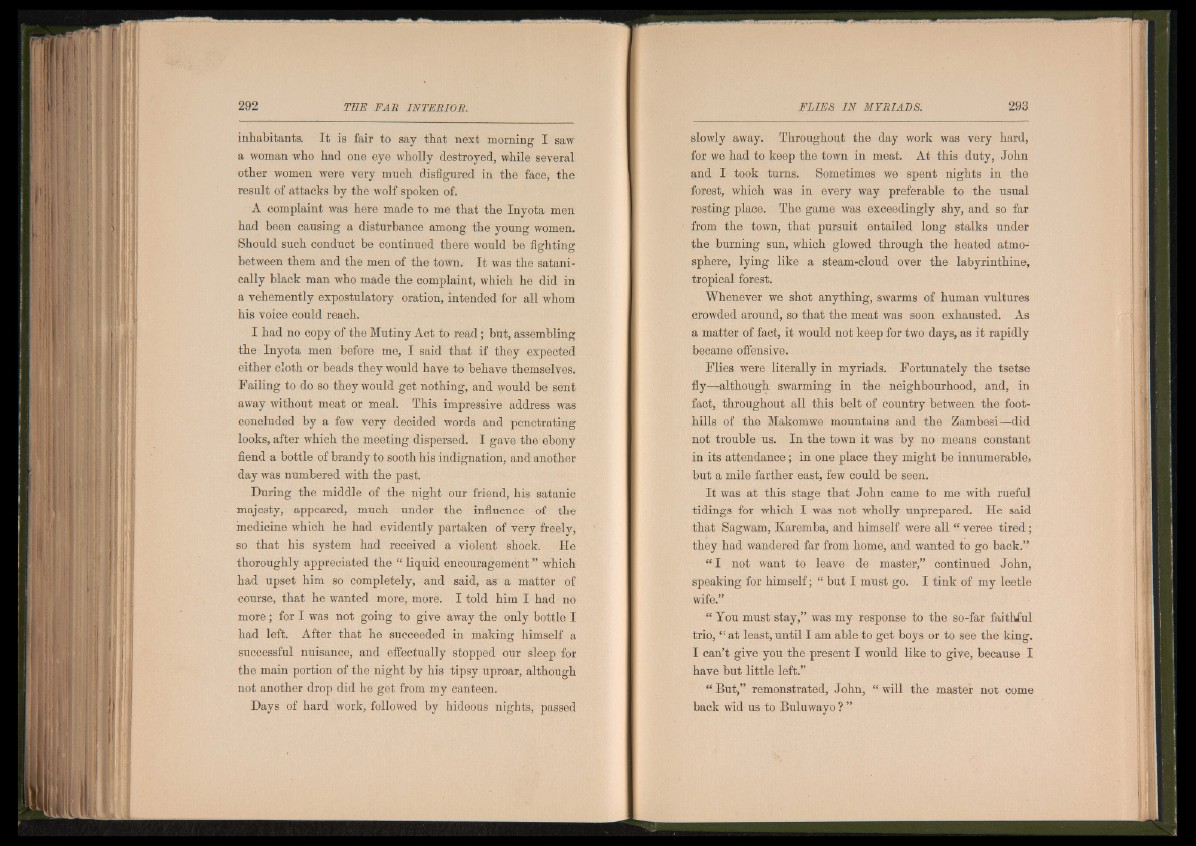
inhabitants. It is fair to say that next morning I saw
a woman who had one eye wholly destroyed, while several
other women were very much disfigured in the face, the
result of attacks by the wolf spoken of.
A complaint was here made to me that the Inyota men
had been causing a disturbance among the young women.
Should such conduct be continued there would be fighting
between them and the men of the town. It was the satani-
cally black man who made the complaint, which he did in
a vehemently expostulatory oration, intended for all whom
his voice could reach.
I had no copy of the Mutiny Act to read ; but, assembling
the Inyota men before me, I said that if they expected
either cloth or beads they would have to behave themselves.
Failing to do so they Would get nothing, and would be sent
away without meat or meal. This impressive address was
concluded by a few very decided words and penetrating
looks, after which the meeting dispersed. I gave the ebony
fiend a bottle of brandy to sooth his indignation, and another
day was numbered with the past.
During the middle of the night our friend, his satanic
majesty, appeared, much under the influence of the
medicine which he had evidently partaken of very freely,
so that his system had received a violent shock. He
thoroughly appreciated the “ liquid encouragement ” which
had upset him so completely, and said, as a matter of
course, that he wanted more, more. I told him I had no
more ; for I was not going to give away the only bottle I
had left. After that he succeeded in making himself a
successful nuisance, and effectually stopped our sleep for
the main portion of the night by his tipsy uproar, although
not another drop did he get from my canteen.
Days of hard work, followed by hideous nights, passed
slowly away. Throughout the day work was very hard,
for we had to keep the town in meat. At this duty, John
and I took turns. Sometimes we spent nights in the
forest, which was in every way preferable to the usual
resting place. The game was exceedingly shy, and so far
from the town, that pursuit entailed long stalks under
the burning sun, which glowed through the heated atmosphere,
lying like a steam-cloud over the labyrinthine,
tropical forest.
Whenever we shot anything, swarms of human vultures
crowded around, so that the meat was soon exhausted. As
a matter of fact, it would not keep for two days, as it rapidly
became offensive.
Flies were literally in myriads. Fortunately the tsetse
fly—although swarming in the neighbourhood, and, in
fact, throughout all this belt of country between the foothills
of the Makomwe mountains and the Zambesi—did
not trouble us. In the town it was by no means constant
in its attendance; in one place they might be innumerable,
but a mile farther east, few could be seen.
I t was at this stage that John came to me with rueful
tidings for which I was not wholly unprepared. He said
that Sagwam, Karemba, and himself were all “ veree tired ;
they had wandered far from home, and wanted to go back.”
“ I not want to leave de master,” continued John,
speaking for himself; “ but I must go. I tink of my leetle
wife.”
“ You must stay,” was my response to the so-far faithful
trio, “ at least, until I am able to get boys or to see the king.
I can’t give you the present I would like to give, because I
have but little left.”
“ But,” remonstrated, John, “ will the master not come
back wid us to Buluwayo ? ”